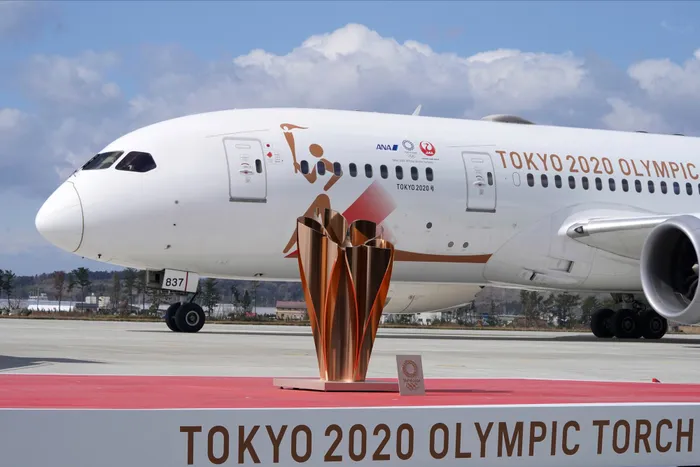Japan welcomes Olympic flame amid uncertainty over virus crisis

The Olympic Flame arrived in Japan on Friday, where Tokyo organizers held a scaled-down ceremony due to fears over the global coronavirus pandemic. Photo: Eugene Hoshiko/AP Photo The Olympic Flame arrived in Japan on Friday, where Tokyo organizers held a scaled-down ceremony due to fears over the global coronavirus pandemic. Photo: Eugene Hoshiko/AP Photo
TOKYO – The Olympic Flame arrived in Japan on Friday, where
Tokyo organizers held a scaled-down ceremony due to fears over the
global coronavirus pandemic.
The flame for this summer's Tokyo Olympics arrived at a military base
in the north-eastern city of Higashi-Matsushima from Greece, six days
before the start of a toned-down torch relay in Fukushima prefecture
on March 26, the site of Japan's worst nuclear disaster.
In Higashi-Matsushima, which was devastated by a powerful earthquake
and the ensuing tsunami in 2011, the ceremony was held without
spectators and the organizers decided not to let about 200 local
primary students attend the event due to the spread of the
coronavirus.
"The flame will encourage and empower local residents who have
contributed to the reconstruction of their region, by going through
the prefectures of Miyagi, Iwate, and Fukushima as the 'Flame of
Recovery,'" Tokyo organizing committee president Yoshiro Mori said,
referring to the hardest-hit areas of the 2011 earthquake, tsunami,
and the nuclear disaster.
The natural disasters left about 18,400 people dead or missing, while
tens of thousands are still unable to return home near the Fukushima
Daiichi nuclear power station due to radiation contamination.
"I hope that the flame that will be relayed across all regions of the
country will shine a light onto a road of hope for many people," Mori
added.
Two three-time gold medallists - judo player Tadahiro Nomura and
freestyle wrestler Saori Yoshida - lit the ceremony cauldron at the
event.
"It is finally starting. Now is a time with many difficulties, but I
hope the torch relay will be able to deliver cheer and hope to
everyone," Yoshida said.
The flame arrival comes at a time when the coronavirus pandemic has
created uncertainty over holding the Olympics as scheduled.
Japanese Prime Minister Shinzo Abe has said repeatedly that his
country will continue to make preparations for the Games as planned.
Meanwhile, International Olympic Committee (IOC) president Thomas
Bach said in an interview with the New York Times that they were
"considering different scenarios."
"But we are contrary to many other sports organizations or
professional leagues in that we are four and a half months away from
the Games... We are talking about the end of July," Bach said in the
interview published on Thursday.
He also stressed that "cancellation is not on the agenda."
The IOC has been criticized for pressing on with preparations for the
Tokyo Games, which are scheduled to begin July 24, despite the global
coronavirus pandemic which has infected more than 240,000 people.
Apart from fears of contracting the virus, athletes and officials
believe that lockdowns in some parts of the world and ongoing
training in others would lead to unfair competition in what is a
career highlight for every athlete.
The IOC admitted that "a solution with the least negative impact for
the athletes" was being sought and Bach said Wednesday's conference
call with athletes was "very constructive and gave us a lot of
insight."